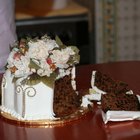
A well-made, beautifully decorated cake adds a festive touch to any occasion, and it's almost mandatory for a kid's birthday. Unfortunately, those moments are exactly when you're least likely to have the time to finish a cake. You can prepare ingredients, such as whipped cream or buttercream, ahead of time, but then there's the question of storage to worry about. Whipped cream always needs refrigeration, but buttercream often doesn't.
Whipped Cream
Whipped cream can be used as a filling between cake layers, as an alternative to a more complicated frosting, or as a decorative finish on cake slices. No matter how you plan to use it, whipped cream needs refrigeration. When it's cold, the butterfat in cream is firm enough to form bubbles as it is beaten, forming the familiar light and airy texture. At room temperature the fat quickly becomes too soft to trap the air. Unrefrigerated whipped cream will collapse, making it unappealing. The foam will remain stable for longer if you whisk in softened gelatin once the cream has begun to form soft peaks.
Buttercream Frosting
While you can choose from hundreds of recipes, a basic buttercream frosting includes only a fat, such as butter or shortening, fine sugar, and colorings and flavorings. None of these are perishable in the short term. Some recipes call for a small amount of milk or cream to be added, and French buttercream uses egg yolks. Italian and Swiss buttercreams use egg whites, whipping them into a frothy meringue before adding them to softened butter. They're especially delicate and airy, and work well on lightweight sponge cakes or angel's food cakes.
When to Refrigerate
Buttercream containing a small amount of milk is stable at room temperature for a few days, but a French-style buttercream using egg yolks should always be refrigerated if you're not serving it right away. Swiss and Italian buttercreams should also be refrigerated for food safety reasons, though their egg whites should be fully cooked if the buttercream is prepared properly. To use the buttercream after refrigeration, remove it from the refrigerator and allow it to come to room temperature. Italian or Swiss buttercreams will lose some of their volume, but will still remain light and fluffy.
Finished Cakes
Finished cakes might or might not require refrigeration, depending how they're assembled. A cake with whipped cream, fresh fruit or a custard-type filling between the layers always needs to be refrigerated, regardless of the buttercream used to finish it. A cake finished with buttercreams that have no perishable ingredients can be kept at room temperature for several days. The fatty buttercream provides an airtight seal, keeping the cake fresh. Cakes made with perishable buttercreams can be refrigerated, preferably under a dome to prevent them absorbing any refrigerator flavors. Bring the cake slowly to room temperature, still covered, to minimize the risk of condensation marring its finish.
Related Articles

Can You Use Heavy Cream When Making ...

Can You Refrigerate a Cake You Ice With ...
How to Make Bakery-Style Whipped Icing

The Difference Between Butter Cream and ...

Do You Need to Refrigerate Whipped ...

The Difference Between Whipped Icing & ...

What Will Happen if You Refrigerate ...

How to Use Gelatin to Thicken Frosting

Do Boston Cream Pie Cupcakes Need ...

How Early Can You Make a Wedding Cake?
Easy Italian Cream Cake Recipe
How to Freeze a Fruitcake

How to Store Buttercream Icing

Can a Cream Cheese-Decorated Cake Be ...

How Long Can Cupcakes Be Stored After ...

Do We Need to Refrigerate Cake Pops?

Does Cream Cheese Filling Have to Stay ...

How to Fix Grainy Whipped Ganache
How to Keep Meringue Pie Topping From ...

How to Defrost a Frozen Cake With ...
References
- On Food and Cooking: The Science and Lore of the Kitchen; Harold McGee
- The Professional Pastry Chef; Bo Friberg
- King Arthur Flour: The Beautiful Side of Baking: Blissful Buttercream
Writer Bio
Fred Decker is a trained chef and certified food-safety trainer. Decker wrote for the Saint John, New Brunswick Telegraph-Journal, and has been published in Canada's Hospitality and Foodservice magazine. He's held positions selling computers, insurance and mutual funds, and was educated at Memorial University of Newfoundland and the Northern Alberta Institute of Technology.
Photo Credits
Brand X Pictures/Brand X Pictures/Getty Images